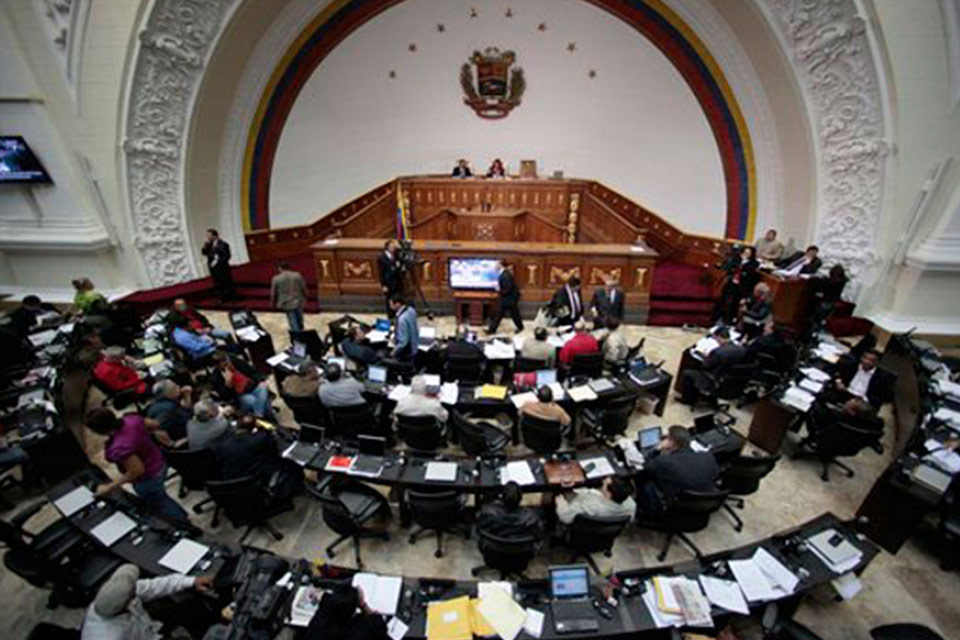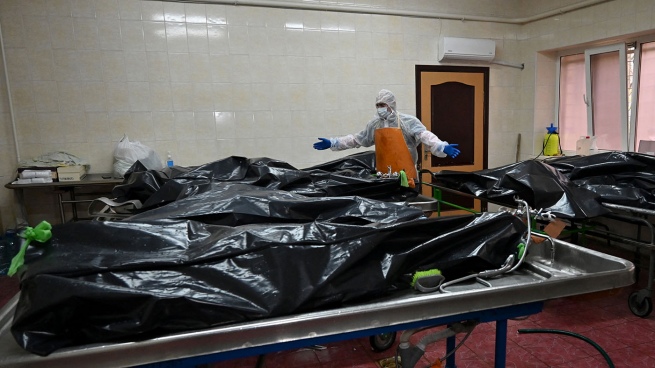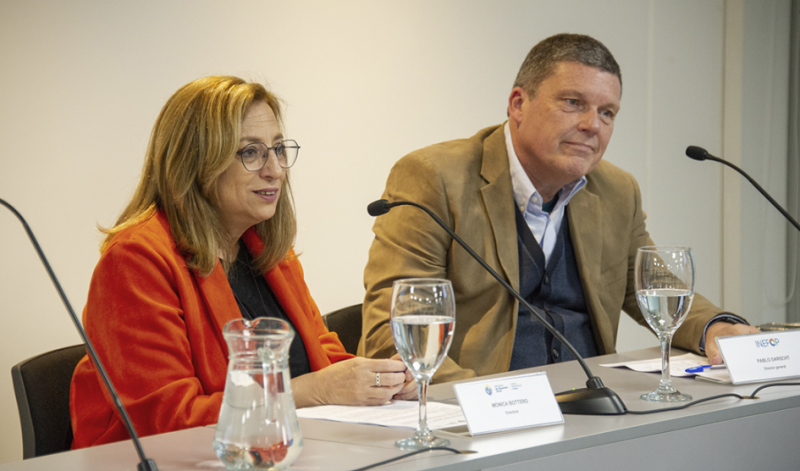The session of this May 5 ended with shouts and warnings from the president of the AN of 2020 Jorge Rodríguez and opposition deputies. Rodríguez asserted that the exodus of Venezuelans was also driven by the Juan Guaidó Transition Statute, the legal support that allowed the AN elected in 2015 to settle for administrative continuity. He warned dissident deputies, among them José Brito, of having to render an account in the future for having signed the document
The discussion of the migration issue in the National Assembly (AN) elected in 2020, ended in warnings to opposition deputies and theories of a “neuroscientific war” against Venezuela that supposedly led to the exodus of Venezuelans.
According to the Chavista deputies of Parliament, the causes that triggered the exodus of Venezuelans were not the derisory salaries, the debacle of basic services, the deterioration of the educational infrastructure, the insecurity or the decline in the living conditions of the citizens, but rather a “multiform warfare” with the aim of inducing migration.
* Read also: Chavismo is itchy when they touch the issue of “starvation wages” in the AN
The opposition deputies refuted the conspiracy theories that Chavismo used as an excuse to avoid mentioning the complex humanitarian emergency that deepened under the nose of the government of Nicolás Maduro, but the reply cost them a warning in the voice of the President of Parliament, Jorge Rodríguez, for having (in the past) signed documents with which the leader of the Legislative Assembly elected in 2015, Juan Guaidó, allegedly sought to threaten the peace of the nation.
The atmosphere of shouts, boos and whistles between the benches began after 11:30 in the morning, at the beginning of the session that, by the way, had been called an hour and a half before. The meeting on May 5 had as its only point the presentation of the report on crimes against Venezuelan migrants abroad that is carried out by the special commission that investigates this issue. The president of the instance, Julio Chávez, was the standard bearer to give the details of the document.
“War against the psyche”, according to the AN
From the speakers’ gallery of the Legislative Chamber, Chávez recycled the speech of a conspiracy by the government of Iván Duque to attack the nation. He said that to these alleged claims were added the more than 500 measures against the Maduro government that, according to him, ended up hitting the nation’s income and reserves.
“Then the fifth-generation war mechanism and the use of neuroscience were incorporated to attack the psyche of Venezuelans, which achieved the objective of inducing migration,” said the official parliamentarian. He pointed out that there are 3.7 million Venezuelans on the continent, of which only Colombia is home to 1.8, despite the fact that the organization that monitors the migratory issue of compatriots states that only in America and the Caribbean the figure is 5,063,560. .
According to the parliamentarian, despite “all these forms of war that sought to change the government,” a strong cohesion was generated in favor of the Maduro government.
The parliamentarian asserted that 82% of the crimes that have occurred against the population of Venezuelan migrants have occurred in Colombian territory. He took the opportunity to point out that Colombia is a drug-producing nation and that it went from having 167 thousand hectares destined for the production of narcotics in 2016 (when Juan Manuel Santos governed) to having 245,000 today (government of Iván Duque).
The report supposedly collects complaints about Venezuelan peasants who are subjected by networks dedicated to drug trafficking to forced labor.
He pointed out that the largest number of murders of Venezuelan migrants is recorded in Colombia. He specified that between 2016 and 2021 some 1,279 Venezuelans were murdered in that country. He made the comparison with figures of deaths with Colombian environmentalists (611 killed between 2016 and 2021) and Colombian signatories of the peace agreements (266 killed between 2016 and 2021).
“The Duque government has been one of massacre and murder. This report gives an account of the existence of non-governmental organizations that have been created to request money, most of these promoted and stimulated hate attacks against Venezuelans. According to the NGO Progresar, more than 1,400 million dollars have allegedly been administered to attend to migration and this has not happened », he said.
He proposed a law for the return of the Venezuelan population abroad and an instance to guide immigration policies to prepare the country for the return of more citizens.
Neuroscience?
“We are talking about Venezuelan migration induced by neuroscience. My sister lives in a town in Mérida where there are no telephone lines. There is no communication war there. Many relatives had to migrate due to low salaries,” Anyely Tamayo, an opposition deputy for that entity, released in response to chavismo. At the same time, she was booed by the parliamentarians of the red awning.
She added to the story that her best friend left the country because her salary was only enough to buy rice and half a kilo of perrarina. “She died in Peru and we do not have an effective policy to repatriate the bodies,” she added.
He questioned the fact that during the presentation of the report, Chávez has given more importance to the subject of the hectares that would be used in Colombia for the production of drugs than to important data such as the receipt of more than 2,532 complaints of crimes that were directed to agency that deals with these issues and to date it is not known if the cases were addressed. He insisted that a clearer policy of action should be planned in the face of these complaints.
He revealed that it was difficult for the instance to count the real number of Venezuelans in the world, for which he proposed to create an international action committee made up of the commission to be in charge of putting a number on the exodus of Venezuelans and developing actions for the care of settled citizens in other nations.
He also asked for the ratification of the title validation agreement that Venezuela signed for the first time between 2018 and 2019 to be approved, but now it has not ratified.
Operation Cayapa, in the AN
Chavismo imposed its dominant arm. The screams and the whistles were heard in the hemicycle at the same time that Tamayo exposed his questions. Then it was the ruling deputy Ilenea Medina, who dismissed what was said by her parliamentary colleague.
“In 20 years, Venezuela has suffered aggression. We must study and remember who promoted the causes of the extraction of our young people. There is a geopolitical plan and for this we must remember when former US President Barak Obama said that Venezuela was a threat,” Medina exclaimed, while the applause of Chavismo could be heard in the background.
He accused the Duque government and its officials of promoting crimes against Venezuela. According to Medina, they have studied the statements of each member of the Colombian Executive. She said that it is necessary to expose the issue of drug production because Venezuelans are victims of mafias dedicated to drug trafficking.
The also deputy Pedro Carreño made a sequel to Medina’s speech, to silence the differences of the dissident bench to government policies. According to the parliamentarian from the US, its allied countries and the Venezuelan opposition, a “multiform war” was carried out that included the attack on basic services -despite the fact that their decline began long before the first measures against the Maduro government-.
Carreño said that stopping social ascent and the deterioration of the quality of life was part of the plan to provoke migration and whose objective (for the US and the opposition) was to tell the world that Venezuelans were fleeing in terror from Maduro.
“It is not true that they left because there were no conditions,” he asserted. On the other hand, he emphasized that the third phase was the criminalization of the nationals that provoked the persecution in other countries.
Deputies Pedro Infate and Tania Díaz, also from the ruling party, completed the cayapa operation that was applied from the caucus to ridicule dissidents. Infante questioned that instead of recognizing the crimes that have been committed against Venezuelans they have tried to manipulate the discourse.
He pointed out that it is important to point out, for example, that the majority of the people stayed in the country and they are the ones who today build the new economy with the ventures. He boasted about the presence of companies such as Yummy, and the Guinness Award won by the National System of Orchestras after the concert that consecrated it as the country with the largest orchestra in the world.
Infante did not mention that after the concert delegations protested how precarious the snack was. “We don’t want bread,” was the slogan he yelled at himself because it was the only thing the musicians received all day.
“They throw stones and hide the hand”
The session of this May 5 ended with some dirty laundry in the sun, back and forth and some warnings. The opposition riled up the ruling party and it all started, just when they wanted to be “taken out of the sack of the opposition that asked for sanctions.”
The opposition deputy Bruno Gallo expressed his concern about the attacks on different thoughts and that instead of claiming good political practices they were throwing mediations out of whack.
«When a single applause is imposed, authoritarianism is imposed. I would ask for respect for diversity. I respect those who were my comrades and who are now on another sidewalk. Do not put me in the same bag as those who ask for sanctions. There is also bureaucracy, corruption and many explanations for what is bad in Venezuela,” said the parliamentarian. At the same time, he pointed out that the important point of the discussion was to seek policies to defend fellow citizens.
The same request was made by José Brito, a deputy who asserted that those who promoted the aggression against the country should be held accountable, this after – as if it were a story center – he said that he met Tomás Guanipa, a leader who follows Juan Guaidó and former candidate for mayor of the Libertador municipality of Caracas, at a fast food stall.
Brito also rejected that only Colombia was blamed for xenophobia against Venezuelans and not the Government of Trinidad and Tobago.
The screams were exacerbated after his intervention, when Jorge Rodríguez took the floor. The President of Parliament told the opposition to “throw the stone and hide their hand” and urged them to respect the majorities just as they (opposition) ask that they respect minorities.
Rodríguez stressed that it is necessary to know the cause of everything in order to determine how to attack the problems. He then affirmed that the Transitional Statute signed by the AN elected in 2015, chaired by Juan Guaidó, was one of the reasons that promoted forced migration. The transition statute is the legal support that allowed the continuity of the AN of 2015.
The parliamentarian followed up on what Brito said about the accountability of some opposition leaders and recalled that both José Brito and deputies Oscar Ronderos (coordinator of the opposition caucus) and José Gregorio Correa had signed the document that, he asserted, « removes the constitution.
He thus asserted that all the signatories, including the aforementioned parliamentarians, must be held accountable. He challenged Brito to prove that he did not sign the document. All this while the opponent shouted from his seat that he did not agree with the statute.
“I recognize the rectification of the policy, but that does not mean that we will play crazy,” he added.
Post Views:
162








